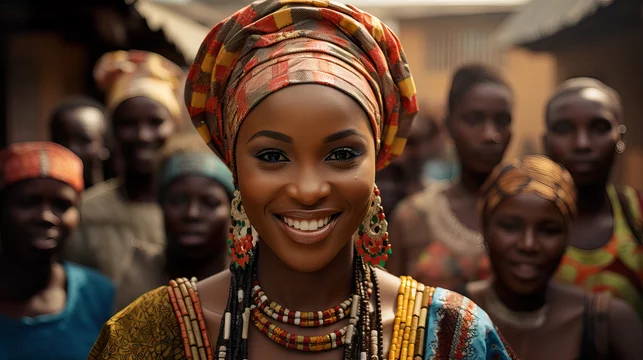
In the heart of Lagos, Nigeria, there was a vibrant community known for its lively nightlife and colorful festivals. Among the many performers who graced the stage, one stood out for his exceptional talent and charisma. His name was Ade, but on stage, he transformed into the dazzling drag queen, Shaniqua Starr. Ade was a young man in his mid-twenties, with a tall, slender build and an infectious smile. By day, he worked as a fashion designer, creating beautiful clothes that captured the essence of Nigerian culture. By night, he became Shaniqua Starr, a queen who challenged the traditional gender norms of his society.
Ade grew up in a conservative family in Lagos. His parents, like many others in their community, believed in strict gender roles. Men were expected to be strong and stoic, while women were expected to be nurturing and submissive. Ade never felt comfortable with these expectations. From a young age, he loved playing with his sister’s dolls and trying on his mother’s clothes. His parents disapproved, often scolding him and telling him to behave like a “real man.” Despite this, Ade’s passion for fashion and performance only grew stronger.
As a teenager, Ade discovered the world of drag through the internet. He was mesmerized by the glamorous queens who defied gender norms and expressed themselves freely. Inspired, he began experimenting with makeup and creating his own costumes. He kept his new hobby a secret, fearing his family’s reaction. But he longed for a space where he could be himself without judgment.
One night, Ade’s best friend, Chidi, invited him to a drag show at a popular club in Lagos. Chidi knew about Ade’s passion for drag and wanted to support him. Ade was hesitant at first, but he finally agreed to go. The club was packed with people from all walks of life, cheering and clapping as queens took the stage. When it was Shaniqua Starr’s turn, the crowd erupted in applause. Ade was amazed by the energy and acceptance in the room. He felt like he had found his true home.
After the show, Chidi encouraged Ade to try performing. “You have the talent, Ade. Don’t let fear hold you back,” he said. With Chidi’s support, Ade decided to take the plunge. He spent weeks perfecting his look and rehearsing his routine. When the night of his debut arrived, Ade was nervous but excited. As Shaniqua Starr, he took the stage with confidence, dazzling the audience with his performance. The crowd’s response was overwhelming. People cheered, whistled, and showered him with praise.
Shaniqua Starr quickly became a beloved figure in Lagos’s drag scene. Ade’s performances were not just about entertainment; they were a statement against the rigid gender norms of his society. Through drag, he showed that it was okay to be different and that gender was not limited to a binary. His performances sparked conversations about gender and identity, challenging people to rethink their beliefs.
As Shaniqua Starr’s popularity grew, so did the support from the LGBTQ+ community. Ade became a role model for many young people who struggled with their own identities. He started hosting workshops, teaching others about drag and encouraging them to embrace their true selves. Through his work, Ade met people from different parts of Africa, each with their own unique stories.
In Accra, Ghana, Ade met Kofi, a young man who had faced similar struggles. Kofi was a talented dancer who loved performing in drag but was afraid of his family’s reaction. Inspired by Shaniqua Starr, Kofi found the courage to come out to his family. Though they were initially shocked, they eventually accepted him and even attended one of his performances. Kofi’s story was a testament to the power of acceptance and the impact of drag culture on changing perceptions.
In Cape Town, South Africa, Ade met Zinhle, a transgender woman who had been rejected by her family. Zinhle found solace in the drag community, where she was embraced and celebrated for who she was. She and Ade became close friends, supporting each other through the challenges they faced. Together, they organized events and workshops, raising awareness about gender diversity and promoting acceptance.
Through his journey, Ade realized that drag culture was not just about performance; it was a movement that empowered people to be themselves. It was a force that challenged societal norms and encouraged acceptance and love. Ade’s transformation into Shaniqua Starr was not just a personal journey but a catalyst for change in his community and beyond.
One day, Ade received a call from his mother. She had heard about Shaniqua Starr and wanted to talk.
Nervously, Ade agreed to meet her. When they sat down together, his mother spoke with tears in her eyes. “Ade, I didn’t understand before. I was afraid of what people would think. But seeing how happy and confident you are as Shaniqua Starr, I realize that all I want is for you to be happy. I’m proud of you, my son.”
Ade was overwhelmed with emotion. For the first time, he felt truly accepted by his family. His mother’s acceptance was a significant step toward bridging the gap between tradition and modernity, showing that love and understanding could overcome fear and prejudice.
As Shaniqua Starr, Ade continued to inspire and advocate for change. He worked tirelessly to create safe spaces for LGBTQ+ individuals and to promote understanding and acceptance. His performances became a symbol of resilience and hope, reminding everyone that being true to oneself was the greatest act of courage.
Drag culture, with its bold defiance of gender norms, has a profound influence on society. It opens minds and hearts, fostering a culture of acceptance and inclusivity. Ade’s journey as Shaniqua Starr was a testament to the transformative power of drag and its ability to challenge and change gender norms, one performance at a time. Through his art, Ade not only found his true self but also paved the way for others to do the same, leaving a lasting impact on the world around him.








